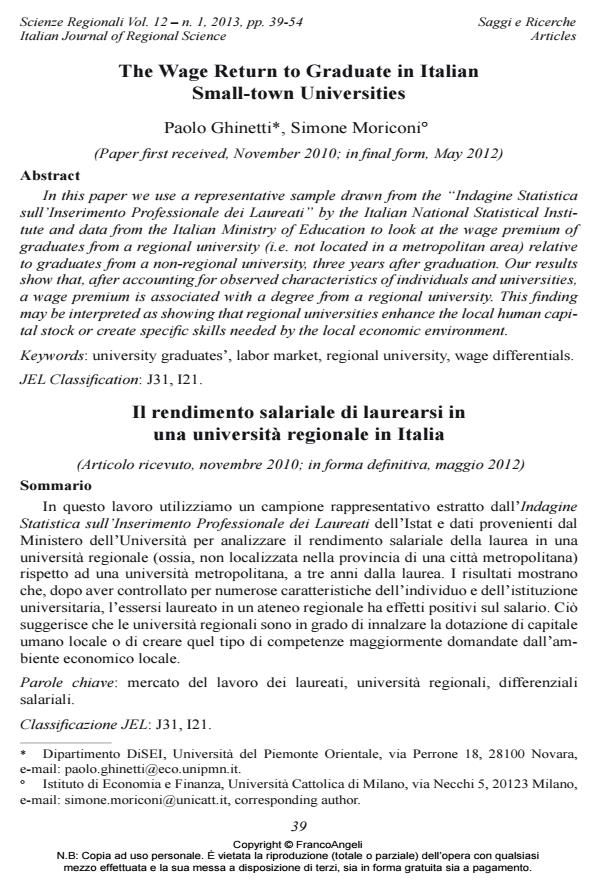The Wage Return to Graduate in Italian Small-town Universities
Journal title SCIENZE REGIONALI
Author/s Paolo Ghinetti, Simone Moriconi
Publishing Year 2013 Issue 2013/1 Language English
Pages 15 P. 39-53 File size 201 KB
DOI 10.3280/SCRE2013-001003
DOI is like a bar code for intellectual property: to have more infomation
click here
Below, you can see the article first page
If you want to buy this article in PDF format, you can do it, following the instructions to buy download credits

FrancoAngeli is member of Publishers International Linking Association, Inc (PILA), a not-for-profit association which run the CrossRef service enabling links to and from online scholarly content.
In this paper we use a representative sample drawn from the "Indagine Statistica sull’Inserimento Professionale dei Laureati" by the Italian National Statistical Institute and data from the Italian Ministry of Education to look at the wage premium of graduates from a regional university (i.e. not located in a metropolitan area) relative to graduates from a non-regional university, three years after graduation. Our results show that, after accounting for observed characteristics of individuals and universities, a wage premium is associated with a degree from a regional university. This finding may be interpreted as showing that regional universities enhance the local human capital stock or create specific skills needed by the local economic environment.
Keywords: University graduates’, labor market, regional university, wage differentials.
Jel codes: J31, I21.
- Theodora Y. (2007), Approach to the Effects of Greek Regional Universities on Development of the Country Regions. In: Coccossis H., Psycharis Y., Regional Analysis and Policy. The Greek Experience. Heilderberg: Physica Verlag. 249-270.
- Storper M., Scott A. J. (2009), Rethinking Human Capital, Creativity and Urban Growth. Journal of Economic Geography, 9, 2: 147-167. DOI: 10.1093/jeg/lbn052
- Schiller D. (2006), Nascent Innovation Systems in Developing Countries: University Responses to Regional Needs in Thailand. Industry and Innovation, 13, 4: 481-504. DOI: 10.1080/13662710601032903
- Persson H., Regnér H. (2004), Universities in the Regional Economy. Evidence From Swedish Employer-Employee Linked Data. Stockholm University: Swedish Institute for Social Research (SOFI), Working Paper, n. 7/2004.
- Moretti E. (2004), Estimating the Social Returns to Higher Education: Evidence from Longitudinal and Repeated Cross-sectional Data. Journal of Econometrics, 121, 1-2: 175-212.
- Gunasekara C. (2006), Universities and Associative Regional Governance: Australian Evidence in Non-core Metropolitan Regions. Regional Studies, 40, 7: 727-741. DOI: 10.1080/00343400600959355
- Frenette M. (2009), Do Universities Benefit Local Youth? Evidence from the Creation of New Universities. Economics of Education Review, 28, 3: 318-328. DOI: 10.1016/j.econedurev.2008.04.004
- Frenette M. (2005), Is Post-secondary Access More Equitable in Canada or the United States?. Ottawa: Statistics Canada. Analytical Studies Research Paper Series, Catalogue n. 11F0019MIE2005244.
- Fan C. S., Stark O. (2008), Rural-to-urban Migration, Human Capital, and Agglomeration. Journal of Economic Behavior & Organization, 68, 1, October: 234-247.
- Eskeland G., Filmer D. (2007), Autonomy, Participation and Learning: Findings from Argentine Schools, and Implications for Decentralization. Education Economics, 15, 1: 103-127. DOI: 10.1080/09645290601133951
- Corak M., Lipps G., Zhao J. (2003), Family Income and Participation in Post-secondary Education. Ottawa: Statistics Canada. Analytical Studies Branch Research Paper Series, Catalogue n. 11F=19MIE2003210.
- Brunello G., Gambarotto F. (2007), Do Spatial Agglomeration and Local Labor Market Competition Affect Employer-provided Training? Evidence from the UK. Regional Science and Urban Economics, 37, 1: 1-21. DOI: 10.1016/j.regsciurbeco.2006.06.006
- Brunello G., Cappellari L. (2008), The Labor Market Effects of Alma Mater: Evidence from Italy. Economics of Education Review, 27, 5: 564-574. DOI: 10.1016/j.econedurev.2007.05.004
- Bratti M., Checchi D., De Blasio G. (2008), Does the Expansion of Higher Education Increase the Equality of Educational Opportunities? Evidence from Italy. Labor, 22, s1: 53-88.
- Black D., Smith J. (2004), How Robust is the Evidence on the Effects of College Quality? Evidence from Matching. Journal of Econometrics, 121, 1-2: 99-124.
- Bagues M., Sylos-Labini M. (2007), Do On-line Labor Market Intermediaries Matter? The Impact of Almalaurea on the University-To-Work Transition. New York: NBER, Working paper n. 13621.
- Andres L., Looker E. D. (2001), Rurality and Capital: Education Expectations and Attainment of Rural, Urban/rural and Metropolitan Youth. The Canadian Journal of Higher Education, 31, 2: 1-45.
- Anderson R., Quigley J., Wilhelmsson M. (2004), University Decentralization as Regional Policy: The Swedish Experiment. Journal of Economic Geography, 4, 4: 371-388. DOI: 10.1093/jnlecg/lbh031
- Agasisti T., Catalano G. (2006), Governance Models of University Systems-towards Quasi-markets? Tendencies and Perspectives: A European Comparison. Journal of Higher Education Policy and Management, 28, 3: 245-262. DOI: 10.1080/13600800600980056
Paolo Ghinetti, Simone Moriconi, The Wage Return to Graduate in Italian Small-town Universities in "SCIENZE REGIONALI " 1/2013, pp 39-53, DOI: 10.3280/SCRE2013-001003